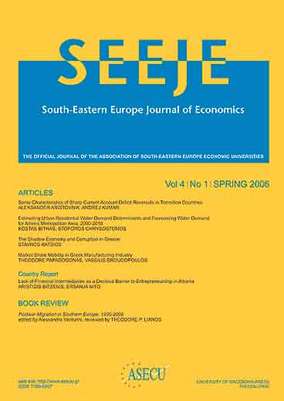The trade balance of Greece in the Euro era
Part of : SEEJE ; Vol.11, No.2, 2013, pages 187-216
Issue:
Pages:
187-216
Author:
Abstract:
The current article examines the trade balance of Greece in the Euro era, in general, and in particular within the Member States of the Euro Zone (EZ). It was found that in the Euro-era, the Greek trade balance has deteriorated in general and particularly within the Member States of the EZ, while losses in competitiveness of the Greek economy have been observed. The structure of production and foreign trade affect the trade deficit and competitiveness of the Greek economy. Moreover, the more rapid rates of inflation in Greece, compared with its trading partners, led to a revaluation of the real exchange rate in the country, affecting its export performance.
Subject (LC):
Keywords:
trade balance, Greece, Euro zone
Notes:
Περιέχει πίνακες και βιβλιογραφία, JEL Classification: F14
References (1):
- Alpha Bank, 2007, “Competition and Inflation: A disastrous relationship”, Economic Bulletin, Issue101, p. 40-41, 47.Amina Naceur Sboui, 2010, “Regional Growth in the Euro Mediterranean Countries: Effects ofIncreasing Retunes and Spatial Externalities”, International Journal of Economics and Finance,vol. 2, No 1, p. 45.Anastasatos Tasos, 2008, “Greek Monetary Policy and the Lessons for the New Europe”, Eurobank,p. 1-3, 26-27.Anastasopoulos G., 2004, “The Greek economy, Strategic Approach”, Ministry of Development,General Secretariat of Industry, p. 57, 59.Bahri Yilmaz, 2008, “Foreign Trade Specialization and International Competitiveness of Greece,Portugal, Spain, Turkey and the EU 12”, Center for European Studies Working Paper Series 166,p. 18.Bank of Greece Governor’s Report 2009, p. 143, 152, 157.Chymis Athanasios, Reziti Joanna, 2010, “Foreign trade of agricultural products and foodstuffs”,KEPE Economic Developments 2010/12, p. 41, 42.ELSTAT.European Commission, 2004, “Meeting the Challenge, The Lisbon Strategy for Growth andEmployment”, Report of the High Level Group chaired by Wim Kok, p. 36, 37, 41.European Commission, 1/2010, “Surveillance of Intra-Euro-Area Competitiveness and Imbalances”,European Economy, p. 68-73, 143.Eurostat.Horafas Vangelis, 2009, “EMU and the global financial crisis», Monthly Review, No. 53.Hossein Varamini, Svetlana Kalash, 2010, “Foreign Direct Investment Inflows, Economic Growth,and Trade Balances: The Experience of the New Members of the European Union”, Journal ofEast-West Business, 16, p. 18-19.INE GSEE-ADEDY, 2010, “Greek Economy and Employment”, Annual Report, p. 172, 177.International Monetary Fund, 2007, “Greece: Selected Issues”, IMF Country Report 07/27.Jan Van Hove, 2010, “Variety and quality in intra-European manufacturing trade: the impact ofinnovation and technological spillovers”, Journal of Economic Policy Reform Vol. 13, No. 1, p.56-57.Jarko Fidrmuc, 2005, “Trade Structure during Accession to the EU”, Post-Communist Economies,Vol. 17, No. 2, p. 232-233.Joakim Gullstrand, 2006, “Demand patterns and vertical intra industry trade with special reference toNorth–South trade”, The Journal of International Trade & Economic Development, 11, p. 446-447.Kothari, S. P., Zimmerman. J. L., (1995), “Price and return models”, Journal of Accounting andEconomics, Vol. 20, No. 2, pp. 155–192.Koukouritakis Minoas, 2006, “EU accession effects on export performance: The case of Greece”,South-Eastern Europe Journal of Economics, p. 165.Kui-Wai Li, Siegfried Bender, 2007, “Productivity and manufacture export causality among worldregions: 1989-1999”, The International Trade Journal, volume xxi, No 2, p. 141-143.Maria Helena Guimaraes, 2010, “How pervasive are national regulations in intra-EE trade?”, TheInternational Trade Journal, volume 24, No 1, p. 48-49.Mariolis Theodore, 2009, “The Euro and the international financial crisis”, Monthly Review, No. 53.Michael G. Arghyrou, Evelyn Bazina, 2002, “Competitiveness and the External Trade Performance ofGreece in the 1990s: A cross-sect oral investigation», Economics and Finance Section”, School ofSocial Sciences, Brunel University, Economics and Finance Discussion Papers, Ν 02-06, p. 17-18.Ministry of Development, 2007, Special Secretariat for Competitiveness, National Competitivenessand Development Council, Annual Competitiveness Report, p. 191-193, and IMF, 2007, Greece:Selected Issues. IMF Country Report 07/27. International Monetary Fund: Washington, D.C.SEVE 2009, “Annual Report on the progress of foreign trade-Euro zone EU-Greece 2004-2008”,p. 7 and 18.Turan Subasat, 2008, “Do liberal trade policies promote trade openness?”, International Review ofApplied Economics, Vol. 22, No. 1, p. 58-59.




